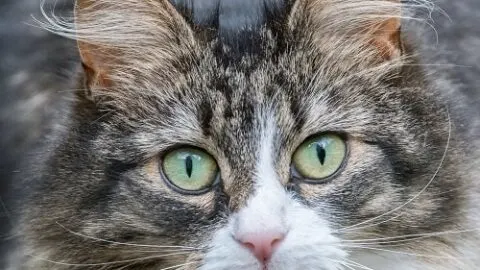Sometimes we want to rock out to music on full volume or know that fireworks are going to be close and loud, or you want to watch an action movie at heart-pounding volume. But for cat owners, it gets a little more complicated. Do we need to be careful about loud noises as cat owners?o loud noises hurt cat ears?
Yes, loud noises can hurt your cat’s ears, and prolonged exposure can make them irritable or frightened, cause hearing loss, and a host of other adverse side effects. Monitoring the volume around your cat is an excellent way to protect their hearing and help keep their stress levels low so they are healthy and happy in your home.
Of course, everyone has a different definition of loud so let’s explore what kinds of noises can negatively affect your cat and why.

Is Loud Noise Bad For Cats
Yes, loud noise can be considered bad for cats. That’s because cats are significantly more sound-sensitive than people, which means that noises sound louder to them than the same sound seems to you. Cats also have a much more comprehensive hearing range and can hear noises slightly lower than people and significantly higher pitched than people.
That means that some noises you don’t think are too loud to be dangerous can harm your cat.
| Sound Type And Decibel (dB) | Safe | Medium (Monitor) | Dangerous |
| A conversation (60-70 dB) | Yes – A normal conversational tone is safe. | ||
| Power Tools (90-110 + dB) | Monitor your cats at this noise level and try to minimize exposure, long term exposure can be damaging | Ideally, keep your cat away from power tools while you’re using them, prolonged exposure can cause hearing damage. | |
| Alarm Clocks (80-85 dB) | Your alarm clock is probably loud enough to be uncomfortable for your cat, but it shouldn’t be damaging except with prolonged exposure. | ||
| Close Helicopter (110 +) | Anything this loud or louder is likely both uncomfortable and damaging for your cat. |
These examples are meant to give you a sense of the volumes that can be harmful to your cat; there are plenty of other sounds that are in the same range as these.
Reasons Loud Noises Hurt Cats Ears
Here are some of the main reasons your cat can be more sensitive to loud noises than you are and why their ears get damaged at lower volumes than yours.
Cat Ears Are More Sensitive Than Yours
Cat ears are designed to hear tiny rustling through the grass and other sounds that can tell them where prey animals are. That means that they can tune into much quieter sounds and that their hearing tends to be more precise than your hearing.
Loud noises mess with that sensitive hearing and can stress your cat even when they aren’t harmful.
Your Cat Hears Things You Can’t Hear
Cats can also hear deeper and higher frequencies of noise than people can, which means that your cat might be hearing things that you can’t hear at any given time. That means that your volume is not their volume. So adding loud noise to the existing volume makes it even louder for your cat than for you.
Excessive Volume Can Damage Your Cat’s Hearing
Because cat’s ears are so sensitive, their inner ear is also more delicate to detect that broader range of sounds. That also means that their ears are more vulnerable to damage than yours.
Your Cat’s Ears Are Designed To Funnel Noise To Their Inner Ear
Since hearing is one of their more critical hunting senses, cat’s ears are also designed to capture more sound than your ears are. This is another reason why your cats are more sensitive to sound than you are.
Your Cat Has Less Control Over Environmental Volume Than You
It’s also worth noting that your cat doesn’t have much control over the volume in your home or whether there are quiet spaces they can access. That means that your cat is more vulnerable to hearing damage, especially when they can’t get away from a sound that makes them uncomfortable.
Are Cats Sensitive To Sound
Yes, cats are incredibly sensitive to sound. Their ears are designed to help them catch prey, even prey that’s quiet and trying to hide. That means that their ears are incredibly sensitive and precise. Cats can also hear noises an average of 4-5 times further away than humans can hear the same noise.
Do High Pitched Sounds Hurt Cats
Yes and no, high pitched sounds can sometimes hurt your cat’s ears the same way high pitched sounds can hurt your ears, though cats can hear higher-pitched sounds than you. Some reports of high-pitched sounds trigger seizures and other adverse responses, but those cases seem to be rare and mainly occur in older cats.
Do High-Frequency Sounds Hurt Cats
Cats can hear at a much higher frequency than humans, but some studies show that high-pitched noises are harmful to them. High pitched sounds can disrupt your cat’s normal physiology, and in some cases, may cause seizures, lethargy, or other unusual behavior.
What Frequency Annoys Cats
Lots of frequencies can annoy cats, and the exact frequencies that annoy each cat can vary. But, the high-pitched sounds coming from electronics have been pretty well documented to be annoying to cats, and morning alarms, car alarms, and some kinds of appliances can also make your feline friend a bit grumpier.
Does Loud Bass Hurt Cats
Bass noises don’t seem to hurt cats the way some high-frequency sounds can, but that doesn’t mean that your cat is alright with the volume. Bass tends to be louder than other kinds of sound and resonates further away from the source, so it may be too loud for your cat. Headphones are a great idea if you want to play an electric bass or listen to some bass-heavy music.
Things To Consider
Cats will typically move away from sounds that are too loud for them, but only if there is a quieter space, they can reasonably get to.
If your cat can’t get away from the sound, they might try to hide or get as far from the sound as they can in the same space, or they might do their best to ignore the sounds.
It’s also important to remember that cat body language can be subtle. You might need to pay close attention to your cat to get a good idea when they are or aren’t upset by a sound. Remember that loud music, practicing an instrument, and even power tools, appliances, and yelling can all be too loud for your cat’s comfort and hearing health.

My name is James, and welcome to FAQCats!
Along with our team of cat owners, expert pet enthusiasts, and pet professionals, we aim to write engaging helpful, engaging content about cats. At FAQCats we strive to provide content that’s accurate and fun to read. Our team writes about everything related to cats; even the most complex of topics. Through extensive research and caring for our own fur-pals, we’re able to provide something cat owners worldwide will love. Have a look around, and leave us feedback anytime!

